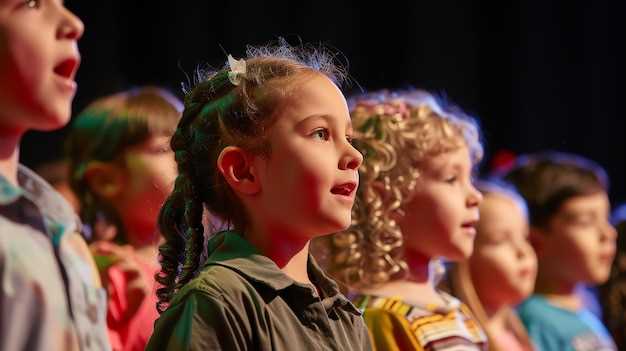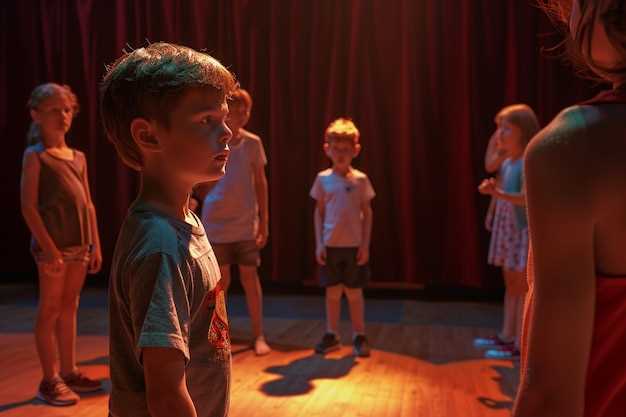An engaging activity can transform learning into an exciting journey. Bringing stories to life captivates young minds, sparking creativity and imagination. Interactive experiences often leave lasting impressions. These experiences build confidence and improve communication skills. Resilient individuals emerge from such a rich environment. Appreciation for diverse perspectives grows.
Performance-based learning offers numerous cognitive benefits. It enhances memory retention. Practical exercises help to understand complex concepts. Collaborative efforts foster teamwork. Together, these elements create a well-rounded development approach. Children with artistic exposure generally exhibit stronger problem-solving abilities. Not only do they grasp content better, but they also become adept at thinking on their feet.
Emotional intelligence skyrockets through sustained engagement in artistic activities. Self-awareness improves significantly. Empathy towards peers flourishes. The trust built within a group setting promotes positive social behavior. Different genres also challenge students to step out of their comfort zones. They dare to explore new ideas and perspectives. This curiosity fuels lifelong learning and growth.
The Impact of Theater on Child Development
Engaging young minds through performing arts is invaluable. It nurtures creativity. It encourages collaboration. It builds confidence. Children become better communicators. They learn empathy. These artistic activities shape their personalities. By immersing in dramatic arts, they grasp broader perspectives and understand different viewpoints. This, in turn, fosters critical thinking, enhances problem-solving skills, and opens up new horizons of emotional intelligence.
Participation boosts public speaking abilities. Kids express their ideas clearly. They become more articulate. This helps in academic endeavors. Regular involvement refines their linguistic skills. Long-term benefits? Absolutely evident. Students who engage in dramatic arts often show improved literacy. They read with more fluency and write with greater clarity.
Social skills get fine-tuned. Children build stronger friendships. They learn to work in teams. Collaborations become second nature. Respect for peers increases. They appreciate diversity. Every performance, every role, teaches responsibility. Rehearsals demand discipline. Meeting deadlines becomes crucial. This instills a sense of duty that transcends the stage.
Let’s not forget emotional growth. Kids become sensitive to others’ feelings. They better grasp their own emotions. Self-expression becomes more nuanced. Emotional resilience strengthens. Handling criticism and feedback improves. These are vital life skills.
In summary, the performing arts form a holistic development tool. They’re vital for nurturing well-rounded, emotionally intelligent, and socially adept individuals. The impact is profound and lasting, influencing every aspect of their growth.
Enhancing Emotional Intelligence
Engagement with dramatic arts offers a compelling way to foster emotional growth. Young audiences often immerse themselves in varied narratives, experiencing a spectrum of feelings. This helps them understand and manage their own emotions better. Through this engagement, social awareness also deepens. Learning to empathize becomes second nature.
Participating in performances or watching them cultivates an appreciation for diverse perspectives. Children begin to see the world through others’ eyes. It builds empathy. They grasp how actions impact feelings. Engaging with different emotional experiences, learners build strong emotional foundations. They learn to respect and value emotional diversity, which is crucial for personal development and social integration.
Dramatic activities often involve collaboration, requiring participants to read and respond to others’ emotions. In doing so, they develop indispensable interpersonal skills. Better interaction skills lead to improved relationships. Awareness of non-verbal cues increases. They notice body language nuances. Detecting these cues strengthens their emotional acuity.
Facilitators can craft exercises focusing on emotional expression and recognition. These activities target specific emotional skills. For instance, role-playing scenarios help individuals practice managing conflict. They also hone problem-solving abilities. By stepping into another’s shoes, they experience diverse emotional landscapes. Understanding these helps them navigate real-life situations more effectively.
Ongoing involvement aids in the continuous refinement of emotional skills. Over time, participants exhibit greater emotional resilience. They become adept at handling stress and overcoming setbacks. Real-life scenarios become easier to manage. Enhancing emotional competencies through dramatic exercises ultimately creates a more empathetic, aware, and balanced individual. Thus, infusing such activities into learning routines is invaluable for emotional development.
Understanding Empathy Through Characters

Engaging with characters in plays can foster a deep understanding of empathy. It’s about feeling what others feel, seeing through their eyes. Children often learn best through experience. By stepping into another’s shoes, they expand their emotional range. This immersion into diverse lives teaches compassion naturally. You’ll see remarkable effects on their social interactions. Gradually, they become more sensitive to others’ feelings and perspectives.
In scripts, diverse characters present varied life situations. Some face joy, others sorrow. Each character’s journey offers a new lesson. This exposure is invaluable. When children observe a character’s struggles and victories, they develop insights into real-life emotions and responses. Empathetic understanding isn’t taught; it’s lived.
Plays create opportunities for kids to explore different cultures and lifestyles. This exploration breaks down biases and preconceptions. They’re no longer just learning empathy; they’re experiencing it directly. Participation in these narratives builds bridges between diverse groups.
A vivid character with well-defined traits can evoke profound reactions. Understanding their motivations and struggles makes students reflect on their own. They begin to acknowledge the complexity of human emotions. This realization fosters a more nuanced view of the world. Students learn that everyone has a story worth hearing.
Teamwork in production also reinforces empathy. Collaborating necessitates respect and understanding. When kids work together on a play, they must communicate effectively. There’s a shared goal that unites them. This process cultivates community and collective empathy.
| Benefit | Explanation |
|---|---|
| Emotional Range | By stepping into varied roles, kids explore different feelings. |
| Compassion | Witnessing characters’ experiences teaches them to be kind and understanding. |
| Perspective | Playing diverse roles helps kids see the world from multiple viewpoints. |
| Community | Working together on plays fosters a collective sense of empathy and teamwork. |
Expressing Emotions Safely on Stage

Engagement in dramatic arts offers young ones an outlet for feelings. Here, they can safely navigate a spectrum of emotions. Anger, joy, sadness, all find a voice under the stage lights. Imagination rules, allowing freedom and security. They learn to channel inner experiences creatively.
Benefits are numerous and multifaceted. Structured activities help in multiple ways:
- Building confidence through rehearsals and performances
- Encouraging empathy by adopting different personas
- Enhancing communication skills via dialogue
- Developing emotional regulation by portraying varied feelings
Children, participating in these exercises, find a constructive way to express what resides within. Shyness diminishes as they get used to performing before an audience. By taking on different characters, they understand multiple perspectives, which fosters empathy.
Guided by skilled mentors, safe spaces are created where feelings can surface without fear of judgment. This guidance is crucial. Children need to know they are supported, their expressions valued. In these supportive environments, they practice emotional expression as a valuable skill. Creativity often serves as a bridge to understanding their own experiences and those of others.
Practical aspects cannot be overlooked. Basics of stage performance, such as:
- Voice modulation
- Body language
- Facial expression
Each element contributes to portraying emotions effectively. Mastery over these skills brings a sense of accomplishment. Confidence on stage often translates into daily life, enhancing overall emotional intelligence. Observing peers also plays a role, children learn by watching others express and cope.
In summary, performing arts provide a unique, supportive environment. Fictional scenarios become a realm for genuine emotional growth. By acting out different roles, they learn coping mechanisms and develop a deeper emotional understanding. The stage becomes a safe haven for exploring and expressing a wide range of human emotions.
Boosting Communication Skills
Engaging in performance art significantly enhances verbal abilities. Young participants express thoughts freely. They articulate emotions vividly. Confidence grows with each act. Eye contact becomes natural. Interaction flows easily on and off the stage. Enacting various roles requires understanding scripts, which enriches vocabulary and storytelling skills.
Collaboration in rehearsals sharpens listening and negotiation. Kids learn to respect diverse opinions. They develop patience while waiting for their turn. Group activities require clear articulation of ideas. Disagreements get resolved through dialogue rather than conflict. This environment nurtures diplomatic conversation skills organically.
Performing for an audience builds public speaking confidence. It reduces apprehensions about addressing larger groups. Overcoming stage fright contributes to self-assurance in other social situations. Practicing lines and cues instills the value of precision in communication. Repeated performances refine these skills efficiently.
Exposure to different genres and scripts broadens linguistic horizons. Comprehending various dialects and accents becomes easier. Memorizing dialogues enhances cognitive abilities. Mastering improvisation boosts quick-thinking and adaptability. These abilities are transferable to real-life conversations.
| Aspect | Benefit |
|---|---|
| Verbal Expression | Articulates emotions, enhances vocabulary |
| Collaboration | Sharpened listening, negotiating skills |
| Public Speaking | Builds confidence, audience engagement |
| Script Understanding | Broadens linguistic horizon, cognitive boost |
Overcoming Stage Fright

Understanding how to manage nervousness in front of an audience can truly empower young minds. Everyone experiences a bit of anxiety when performing. It’s normal, even expected. But learning to navigate these nerves is crucial. Imagine the confidence boost when one successfully faces their fears. Encouraging children to embrace this process unlocks new potentials.
Firstly, practice is key. Frequent rehearsals build familiarity. Familiarity reduces anxiety. Encourage students to practice in different settings. They can perform for family members, friends, or even a mirror. These small steps build confidence gradually. Importantly, celebrate each milestone, no matter how minor. Second, teach them deep-breathing exercises. A deep breath can be incredibly calming. Combine this with a positive mindset.
| Strategy | Benefit |
|---|---|
| Regular Rehearsals | Builds comfort and reduces nervousness |
| Deep-Breathing Techniques | Calms the nervous system and reduces anxiety |
| Positive Visualization | Encourages a confident mindset |
Visualization also plays a pivotal role in overcoming stage fright. Encourage students to visualize success before stepping on stage. They should imagine a positive reaction from the audience. This mental rehearsal can be as powerful as physical practice. Finally, create a supportive environment. Foster a culture where mistakes are part of the journey. Highlight that every performer, no matter how experienced, started somewhere. Normalize the experience of feeling stage fright.
Emphasizing these methods not only helps with performances but also instills valuable life skills. Confidence gained from conquering stage fright can pervade other aspects of their lives. It builds resilient, assured individuals ready to take on challenges beyond the stage. So, patiently guide them. Celebrate their progress. The journey of overcoming stage fright is as enriching as the performance itself.
Improving Verbal Articulation
Enhancing speech clarity in youngsters can be a rewarding endeavor. Engaging in performative activities serves as a practical method. These interactions encourage more than just spoken communication. They boost confidence and help with social skills. Interaction in this context provides a unique platform for expressing ideas.
- Pronunciation Practice:Regular verbal exercises sharpens enunciation. Performances require precise speech.
- Vocal Variations:Different roles necessitate varied vocal tones and pitches, expanding vocal range.
- Listening Skills:Listening and responding to cues improve understanding and reaction times.
Children involved in dialog-heavy scenes learn to modulate their voices. This adjustment is essential for conveying different emotions effectively. They become keen observers of speech patterns, both their own and others’. Often, this results in better public speaking skills overall.
- Regular rehearsals instill discipline. Structure in practice aids clarity.
- Group activities foster collaborative dialogue. Peer feedback sharpens articulation.
- Diverse scripts introduce new vocabulary. Exposure to new words is constant.
- Improvised scenes enhance quick thinking. Rapid responses improve fluency.
Before long, improvements in enunciation are noticeable. Youngsters not only speak clearer but also project their voices more confidently. This combination of articulation and projection is invaluable. As a result, their ability to communicate effectively in academic and social settings increases, paving the way for future success.
Encouraging Teamwork
Working together is fundamental in performance arts. It’s all about collaboration. Every participant has a unique contribution. Different talents merge to create something exceptional. No one can succeed alone. Long-term, this cultivates trust and mutual respect.
Engagement in group activities helps develop social skills.Kids learn to communicate effectively. They understand the value of listening. Compromise emerges naturally. Each individual becomes more empathetic. Importantly, they realize the significance of support. Group dynamics teach patience and perseverance. When everyone strives toward a common goal, the outcome is often more rewarding than solitary efforts. Youngsters discover that obstacles are more easily overcome with collective input. They learn to appreciate diverse perspectives and innovate together. This not only enhances problem-solving abilities but also fosters a sense of belonging and unity.
Sharing responsibilities enhances accountability.Everyone’s effort matters. Trust builds steadily. With each success, confidence grows. Responsibilities are distributed fairly. Children feel a sense of ownership. By working through challenges together, they develop a stronger appreciation for the efforts of their peers. This encourages them to contribute more actively and positively influences their self-esteem and sense of purpose.
In these settings, friendships blossom naturally. Everyone contributes to their fullest. Working side-by-side, bonds strengthen. People who start as strangers often become close allies. Shared experiences forge lasting connections, creating supportive communities. These environments promote a culture of cooperation and camaraderie that extends beyond the stage, positively impacting other areas of participants’ lives.
Video:
Drama Games for Students: King of the Jungle
Drama Games for Students: King of the Jungle by Singapore Repertory Theatre 67,750 views 2 years ago 3 minutes, 13 seconds